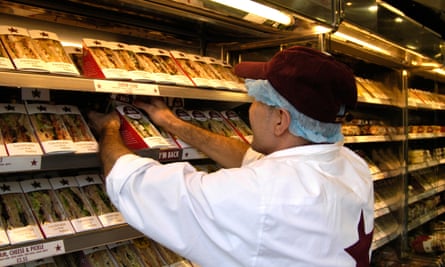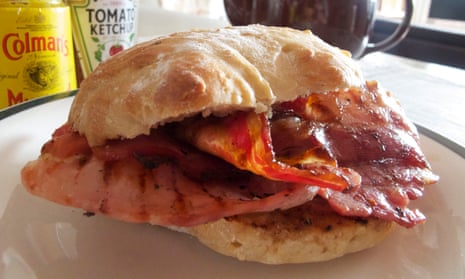Bread is back. In a major review hailed by critics of the low-carb trend, the World Health Organization has decreed that wholegrain breads can help combat a range of diseases, such as diabetes, cardiovascular problems and cancer.
But did bread ever really go away? The headline news has looked dire in the last few years: white-sliced sales down 12% in the five years to 2017, according to retail analysts Mintel; M&S launching those weird high-protein sandwiches (“half the bread but all the filling”); storied baking powerhouse Warburtons launching gluten-free wraps. But this low-carb trend always felt like a fad awaiting a correction – long before the latest news.
One in 10 of us may now avoid gluten. But finding comfort in carbs is so hardwired into the British psyche that bread never really fell out of fashion. I am not just saying this as a northerner who grew up with a tower of bread and butter beside every meal (even spaghetti bolognese) – the data bears this out. In 2017, Warburtons, Kingsmill and Hovis occupied three of the top five positions in the Brand Footprint UK rankings, Kantar’s study of Britain’s most-frequently bought brands.
Bread is clearly a national obsession. You do not have to have grown up north of Watford, immersed in the canton-like squabbles over the correct name for a bap, barm cake, oven-bottom and so on – a linguistic creativity that embodies our deep national affection for bread – to love the stuff. We all do. In all its forms, healthy or not.
It is after all key to so many of British food’s biggest pleasures: from breakfast toast thick with salted butter to that frugal favourite, bread and butter pudding. As a nation, we revere the bacon sandwich, a meal in which even that most (among foodies, at least) derided of breads, processed Chorleywood white-sliced, comes into its own.

Is it any wonder that, as part of our recent love-in with trashy US diner food, the grilled cheese sandwich has taken off nationwide? That was one import that was knocking at an open door. According to the British Sandwich Association, we eat 11.5bn sandwiches every year. Retail of pre-packed sandwiches in the UK, what the Guardian once called the “sandwich industrial complex”, is worth £8bn a year. Frankly, a lot of these bought sandwiches, even those we tend to think of as the posh versions from Pret or M&S, are terrible. But their ubiquity speaks for itself. Almost everyone in the UK has strident opinions about the correct way to make an egg mayo or ham and cheese sandwich. How many food products bind us together like that?
Incidentally, for a truly exceptional sandwich, try the bacon butty at London’s St John Bread and Wine restaurant; sausages from Andrew Francis stuffed into Walton’s bakery breads at Vaughans in Ludlow; or seasonal Kentish ingredient stickler Jonny Sandwich’s stall at Canterbury’s Goods Shed.
At the other end of the scale, in the past few years, serving painstakingly homemade bread with cultured butter – often as a course in its own right – has become a highlight of meals in many top-end restaurants.
Quite where we are with overall bread quality is a moot point. There are two main problem areas. A lot of pre-sliced, processed bread is pretty terrible (with its flaked barley and jumbo oats, Jackson’s brown bloomer, while not technically wholegrain, is a reasonably tasty, widely available alternative). On the one hand, bread is the gloriously democratic lingua franca of British food. On the other, we have industrialised it the point where it is an insult to consumers: pappy, plastic, gummy and so full of something – be it innumerable additives or wheat strains bred with an unnatural abundance of gluten – that, for a significant number of people, left painfully bloated or running for the loo after lunch, there is something strange going on at the intersection of bread, irritable bowels and non-coeliac gluten sensitivity.
In terms of straight flavour, the huge growth of supermarket “artisanal” breads is equally bad. Whether bagged or “baked” on site, these are frequently a pale shadow of the genuinely slow-fermenting loaves, created with just flour, water, salt, traditional yeasts and a little patience, by adherents to the Real Bread Campaign.
Over the last few years, such bakeries have enjoyed a remarkable resurgence. Around Manchester, for instance, the likes of Pollen, Levenshulme’s Trove or Lovingly Artisan (a Cumbrian bakery that has an outlet at Altrincham market), are retailing sourdoughs and other varieties of breads that boast incredible depths of flavour. But such breads remain relatively expensive and hard to find.
Most people in Britain still have to put themselves out to eat great bread. For a product so central to our enjoyment of food, that is a disgrace. Inspired by the WHO, we need to demand the better bread we all deserve.
